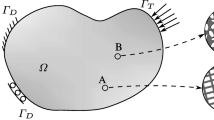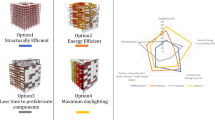Abstract
In the paradigm of computer experiments, the choice of an experimental design is an important issue. When no information is available about the black-box function to be approximated, an exploratory design has to be used. In this context, two dispersion criteria are usually considered: the minimax and the maximin ones. In the case of a hypercube domain, a standard strategy consists of taking the maximin design within the class of Latin hypercube designs. However, in a non hypercube context, it does not make sense to use the Latin hypercube strategy. Moreover, whatever the design is, the black-box function is typically approximated thanks to kernel interpolation. Here, we first provide a theoretical justification to the maximin criterion with respect to kernel interpolations. Then, we propose simulated annealing algorithms to determine maximin designs in any bounded connected domain. We prove the convergence of the different schemes. Finally, the methodology is applied on a challenging real example where the black-blox function describes the behaviour of an aircraft engine.
Similar content being viewed by others
References
Auffray, Y., Barbillon, P., Marin, J.-M.: Modèles réduits à partir d’expériences numériques. J. Soc. Fr. Stat. 152(1), 89–102 (2011)
Bartoli, N., Del Moral, P.: Simulation & algorithmes stochastiques. Cépaduès (2001)
Bratley, P., Fox, B.L.: Algorithm 659: Implementing Sobol’s quasirandom sequence generator. ACM Trans. Math. Softw. 14(1), 88–100 (1988)
Bursztyn, D., Steinberg, D.M.: Comparison of designs for computer experiments. J. Stat. Plan. Inference 136(3), 1103–1119 (2006)
Chib, S., Greenberg, E.: Understanding the Metropolis-Hastings algorithm. Am. Stat. 49(4), 327–335 (1995)
Cressie, N.A.C.: Statistics for Spatial Data. Wiley Series in Probability and Mathematical Statistics: Applied Probability and Statistics. Wiley, New York (1993)
den Hertog, D., Kleijnen, J., Siem, A.: The correct Kriging variance estimated by bootstrapping. J. Oper. Res. Soc. 57(4), 400–409 (2006)
Fang, K.-T., Li, R., Sudjianto, A.: Design and Modeling for Computer Experiments (Computer Science & Data Analysis). Chapman & Hall/CRC, London/Boca Raton (2005)
Hastings, W.: Monte Carlo sampling methods using Markov chains and their applications. Biometrika 57(1), 97–109 (1970)
Johnson, M.E., Moore, L.M., Ylvisaker, D.: Minimax and maximin distance designs. J. Stat. Plan. Inference 26(2), 131–148 (1990)
Joseph, V.R.: Limit kriging. Technometrics 48(4), 458–466 (2006)
Koehler, J.R., Owen, A.B.: Computer experiments. In: Design and Analysis of Experiments, Handbook of Statistics, vol. 13, pp. 261–308. North-Holland, Amsterdam (1996)
Laslett, G.M.: Kriging and splines: an empirical comparison of their predictive performance in some applications. J. Am. Stat. Assoc. 89(426), 391–409 (1994)
Li, R., Sudjianto, A.: Analysis of computer experiments using penalized likelihood in Gaussian Kriging models. Technometrics 47(2), 111–120 (2005)
Locatelli, M.: Convergence properties of simulated annealing for continuous global optimization. J. Appl. Probab. 33(4), 1127–1140 (1996)
Lophaven, N.S., Nielsen, H.B., Sondergaard, J.: DACE, a Matlab Kriging toolbox. Technical Report IMM-TR-2002-12, DTU (2002)
Madych, W.R., Nelson, S.A.: Bounds on multivariate polynomials and exponential error estimates for multiquadric interpolation. J. Approx. Theory 70(1), 94–114 (1992)
Matheron, G.: Principles of Geostatistics. Econ. Geol. 58(8), 1246–1266 (1963)
McKay, M., Beckman, R., Conover, W.: A comparison of three methods for selecting values of input variables in the analysis of output from a computer code. Technometrics 21(2), 239–245 (1979)
Mease, D., Bingham, D.: Latin hyperrectangle sampling for computer experiments. Technometrics 48(4), 467–477 (2006)
Morris, M.D., Mitchell, T.J.: Exploratory designs for computational experiments. J. Stat. Plan. Inference 43, 381–402 (1995)
Roberts, G.O., Rosenthal, J.S.: Harris recurrence of Metropolis-within-Gibbs and trans-dimensional Markov chains. Ann. Appl. Probab. 16(4), 2123–2139 (2006)
Sacks, J., Schiller, S., Mitchell, T., Wynn, H.: Design and analysis of computer experiments (with discussion). Stat. Sci. 4(4), 409–435 (1989a)
Sacks, J., Schiller, S.B., Welch, W.J.: Designs for computer experiments. Technometrics 31(1), 41–47 (1989b)
Santner, T.J., Williams, B.J., Notz, W.I.: The Design and Analysis of Computer Experiments. Springer Series in Statistics. Springer, New York (2003)
Schaback, R.: Error estimates and condition numbers for radial basis function interpolation. Adv. Comput. Math. 3(3), 251–264 (1995)
Schaback, R.: Kernel-based meshless methods. Technical report, Institute for Numerical and Applied Mathematics, Georg-August-University Goettingen (2007)
Stein, M.L.: Interpolation of Spatial Data. Some Theory for Kriging. Springer Series in Statistics. Springer, New York (1999)
Stein, M.L.: The screening effect in Kriging. Ann. Stat. 30(1), 298–323 (2002)
Stinstra, E., den Hertog, D., Stehouwer, P., Vestjens, A.: Constrained maximin designs for computer experiments. Technometrics 45(4), 340–346 (2003)
Tierney, L.: A note on Metropolis-Hastings kernels for general state spaces. Ann. Appl. Probab. 8(1), 1–9 (1998)
van Dam, E.R., Husslage, B., den Hertog, D., Melissen, H.: Maximin Latin hypercube designs in two dimensions. Oper. Res. 55(1), 158–169 (2007)
Author information
Authors and Affiliations
Corresponding author
Rights and permissions
About this article
Cite this article
Auffray, Y., Barbillon, P. & Marin, JM. Maximin design on non hypercube domains and kernel interpolation. Stat Comput 22, 703–712 (2012). https://doi.org/10.1007/s11222-011-9273-9
Received:
Accepted:
Published:
Issue Date:
DOI: https://doi.org/10.1007/s11222-011-9273-9




